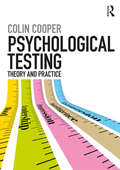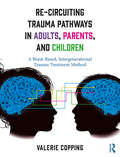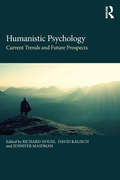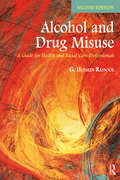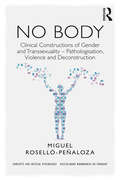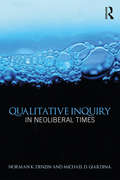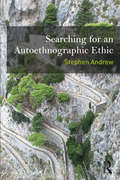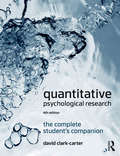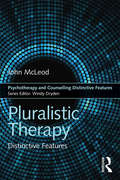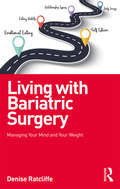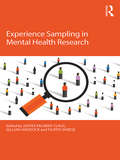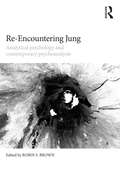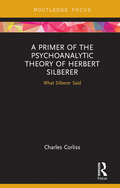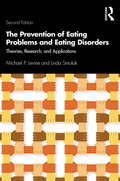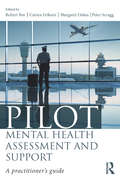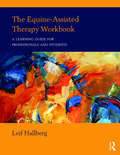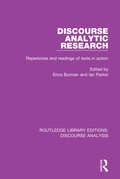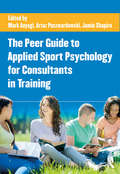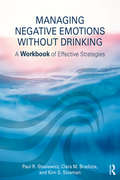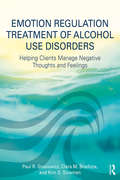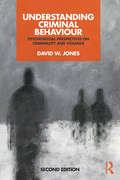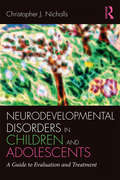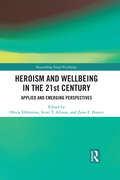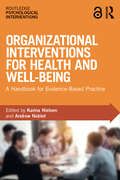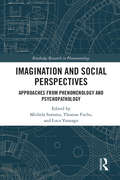- Table View
- List View
Psychological Testing: Theory and Practice
by Colin CooperPsychological tests are everywhere. They are widely used by practitioners, researchers, clinicians, and educators -anyone, in fact, who needs to measure various aspects of personality, cognitive abilities, mood and suchlike. Psychometrics is the science of psychological assessment. It covers the construction, use and interpretation of psychological tests of all kinds – from simple questionnaires measuring personality, moods and attitudes, through to specialised tests measuring IQ and other mental abilities. Psychological Testing: Theory and Practice provides test users, test developers, practitioners and researchers in the social sciences, education and health with an evaluative guide to choosing, using, interpreting and developing tests. Its aim is to give readers a thorough grasp of the principles (and limitations) of testing, together with the necessary methodological detail. Unusually for an introductory text, it includes coverage of several cutting-edge techniques. If you find mathematics frightening and statistics dull, this engaging text will help you to understand the fundamental principles of psychometrics, that underpin the measurement of any human characteristic using any psychological test. The book is accompanied by additional resources, including a set of spreadsheets which use simulated data and other techniques to illustrate important issues, and allow users to understand various statistical procedures work, without getting bogged down in mathematical detail. These are fully integrated into the text. This is an essential introduction for all students of psychology and related disiplines, as well as a useful resource for practitioners and those seeking accreditation in psychological testing.
Re-Circuiting Trauma Pathways in Adults, Parents, and Children: A Brain-Based, Intergenerational Trauma Treatment Method
by Valerie CoppingRe-Circuiting Trauma Pathways in Adults, Parents, and Children presents the evidence-informed and substantiated Intergenerational Trauma Treatment Model (ITTM), with an emphasis on up-to-date trauma theory, the development of specialized clinical skills, and the replicability of methods. Grounded in original research, experiential practice, and mathematical principles of logic, the ITTM targets and treats both the child’s and the caregiver’s complex trauma, providing the content and the process for supplying an effective, and brief, caregiver-first treatment option. It delivers an innovative, multigenerational approach to complex trauma treatment that strengthens the caregiver-child relationship by motivating and teaching caregivers to help their children cope with the effects of trauma.
Humanistic Psychology: Current Trends and Future Prospects
by Richard House, David Kalisch and Jennifer MaidmanThis book provides a thought-provoking examination of the present state and the future of Humanistic Psychology, showcasing a rich international contributor line-up. The book addresses head-on the current state of a world in crisis, not only placing the current conjuncture within a wider evolutionary context, but also demonstrating the specifically humanistic-psychological values and practices that can help us to transform and transcend the world’s current challenges. Each chapter looks in depth at a variety of issues: counselling and psychotherapy, creativity and the humanities, post-traumatic stress, and socio-political movements and activism. The book amply confirms that Humanistic Psychology is as alive, and as innovative and exciting, as it ever has been, and has tremendous relevance to the uncertainties that characterize the unprecedented individual and global challenges of the times. It celebrates the diverse and continuing significance of Humanistic Psychology by providing a robust and reliable roadmap for a new generation of counsellors and psychotherapists. In these richly diverse chapters will be found inspiration, pockets of resistance, mature critical reflexivity and much much more - a book accurately reflecting our present situation, and which is an invaluable addition to the psychology literature.
Alcohol and Drug Misuse: A Guide for Health and Social Care Professionals
by G. Hussein RassoolWritten by an experienced academic author, lecturer and practitioner, this comprehensive textbook provides an introduction to alcohol and drug misuse. It presents: the context of alcohol and drug misuse, and the nature and theories of addiction, including a historical overview and policy initiatives in contemporary society an overview of the problems associated with psychoactive substances and their impact on groups such as culturally and linguistically diverse communities, young people, women, older people and the homeless an understanding of the generic role responses to substance misuse in a variety of different settings and contexts, including primary care, the community and hospitals a framework for assessment, care planning, harm reduction approaches, dealing with overdose, intoxication and withdrawals, and psychological and pharmacological interventions an accessible and skills-oriented approach to assist students and practitioners in dealing with alcohol and drug misuse. This new edition is fully updated and includes new material on: evidence-based pharmacological interventions; recent global strategies in alcohol and drug; dual diagnosis and women; shisha smoking; and current statistics on prevalence of alcohol and drug misuse Alcohol and Drug Misuse takes into account current policy and practice for substance use and misuse and includes a range of pedagogical features to enhance learning. It is essential reading for nursing, health and social work students taking substance misuse modules, as well as related CPD courses for health and social care professionals.
NO BODY: Clinical Constructions of Gender and Transsexuality - Pathologisation, Violence and Deconstruction (Concepts for Critical Psychology)
by Miguel Roselló-PeñalozaWhat articulations between bodies, genders and desires are required socio-culturally for recognition of what is human? What happens with those people who do not meet the heteronormative criteria of intelligible life? Are psychology and medicine part of the solution, or part of the problem? <P><P>This pioneering book presents a novel analysis of transgender constructions within a clinical setting, examining the experiences of "transsexuality in treatment" interpreted through psychological, feminist, post-structuralist and queer theories. Based on research that includes interviews with the clinic’s professionals and users, notes from its group therapy sessions, and analysis of its manuals and scientific productions, the author shows how the psychological sciences not only "treat" transsexuality, but construct it in each of its elements: corporality, sexuality, identity, performances and vulnerability. Looking at the work of philosophers such as Michel Foucault, Judith Butler and Paul B. Preciado, this book also highlights how the productive character of language and other subjectifying technologies are linked to the symbolic and material violence that falls on these bodies, deconstructing the bio-scientific and sociocultural conceptions that nourish the understanding of trans life experiences that are medicalised and psychopathologised. <P><P>No Body is a valuable book for students, researchers and professionals in critical psychology, psychiatry and social sciences, and anyone interested in the fields of transsexuality and homo/transphobia, feminism and queer theory, discourse analysis and the construction and signification of the body, gender and sexualities.
Qualitative Inquiry in Neoliberal Times (International Congress of Qualitative Inquiry Series)
by Michael D. Giardina Norman K. DenzinQualitative Inquiry in Neoliberal Times is written from the perspective that the scholarly lives of academics are changing, constantly in flux, and increasingly bound to the demands of the market – a context in which the university has increasingly morphed into a business enterprise, one that treats students as consumers to be marketed to, education as something to be purchased, and research as something to be capitalized on for financial gain. The effects of this market-orientation of scholarly life, especially on those in the social sciences and humanities, are ones that demand serious examination. At the same time, qualitative inquiry itself is changing and evolving within and against the rhythms of this ‘new normal’. This volume engages with these emerging debates in qualitative research over new materialism, 'data', public policy, research ethics, public scholarship, and the corporate university in the neoliberal age. World-renowned contributors from the United States, United Kingdom, Spain, Norway, Australia, and New Zealand present a global perspective on these issues, framed within a landscape of higher education marked if not marred by efficiency metrics, accountability, external funding, and university rankings. Qualitative Inquiry in Neoliberal Times is a must-read for faculty and students alike interested in the changing dynamics of their profession, whether theoretically, methodologically, or structurally and materially. This title is sponsored by the International Association of Qualitative Inquiry, a major new international organization that sponsors an annual congress.
Searching for an Autoethnographic Ethic (Writing Lives: Ethnographic Narratives)
by Stephen AndrewThis volume is a call for integrity in autoethnographic research. Stephen Andrew weaves together philosophy, critical theory, and extended self-reflections to demonstrate how and why qualitative researchers should assess the ethical quality of their work. He also offers practical tools designed to limit the likelihood of self-indulgence and solipsism in first-person writing. Equally instructive and exemplary, his work: Is written in a relatable style that draws readers in and encourages them to think critically about the implications and effects of their writing. Examines the history of qualitative and autoethnographic research. Provides implementable strategies for textualizing lived experiences and relationships with others.
Quantitative Psychological Research: The Complete Student's Companion
by David Clark-CarterQuantitative Psychological Research: The Complete Student's Companion expertly guides the reader through all the stages involved in undertaking quantitative psychological research: designing a study, choosing a sample of people, undertaking the study, analysing the data, and reporting the research. Accessibly written and clearly presented, the book is designed for anyone learning to conduct quantitative psychological research. It covers the full research process, from the original idea to reporting the completed study, emphasising the importance of looking beyond statistical significance in evaluating data. The book provides step-by-step guidance on choosing, interpreting and reporting the appropriate analysis, featuring worked examples and extended calculations as appendices for advanced readers. This edition features new chapters on exploratory factor analysis, logistic regression and Bayesian statistics, and has been thoroughly updated throughout to reflect the latest research practices. Care has been taken to avoid tying the book to any specific statistical software, providing readers with a thorough grounding in the basics no matter which package they go on to use. Whether you’re at the beginning of your undergraduate degree or working towards your masters or doctorate, this book will be invaluable for anyone looking to understand how to conduct quantitative psychological research.
Pluralistic Therapy: Distinctive Features (Psychotherapy and Counselling Distinctive Features)
by John McLeodPluralistic Therapy: Distinctive Features offers an introduction to what is distinctive about this increasingly popular method. Written by one of the co-founders of pluralistic therapy, and a leading UK figure in counselling and psychotherapy, this book describes 15 theoretical features and 15 practical techniques for practitioners. Pluralistic therapy is a flexible, integrative approach to counselling and psychotherapy, which has also found applications in fields such as mental health, life coaching and careers guidance. Pluralistic Therapy: Distinctive Features will provide an essential guide to students and practitioners of psychotherapy, or an allied area of practice, who are open to learning about new ideas and techniques from current interdisciplinary research.
Living with Bariatric Surgery: Managing your mind and your weight
by Denise RatcliffeLiving with Bariatric Surgery: Managing Your Mind and Your Weight aims to help those who are considering bariatric surgery develop a psychological understanding of their eating behaviour and the changes needed in order to make surgery successful. It is also a resource for those who have undergone surgery to help them adapt to the physical, psychological and relationship adjustments that occur. Whilst the benefits of bariatric surgery are significant, the psychological challenges it presents for patients have been overlooked. This book will help patients develop a realistic view of bariatric surgery and the changes required. It incorporates the real-life experiences of people who have had bariatric surgery, showing how they have responded to the psychological and behavioural changes after surgery, and also features helpful psychoeducation, exercises and strategies to facilitate reflection and learning. Living with Bariatric Surgery will be an essential guide for anyone considering, preparing for or recovering from bariatric surgery, as well as health professionals working with these clients.
Experience Sampling in Mental Health Research
by Jasper Palmier-Claus Gillian Haddock Filippo VareseExperience Sampling in Mental Health Research provides comprehensive and user-friendly guidance on when and how to apply this methodology in the assessment of clinical populations. Divided into three sections, the book offers step-by-step instruction on how to design, develop and implement an ESM study, as well as advice on how this approach might be adapted for common mental health difficulties. With an eye to the future of this type of research, the contributors also consider how ESM might be adapted for use as a form of clinical assessment and intervention. Experience Sampling in Mental Health Research combines the knowledge and expertise of leading international experts in the field, and will be helpful for students, researchers and clinicians wishing to start or develop their understanding of this methodology.
Re-Encountering Jung: Analytical psychology and contemporary psychoanalysis
by Robin S. BrownSince the split between Freud and Jung, psychoanalysis and analytical psychology have largely developed in an atmosphere of mutual disregard. Only in recent years have both discourses shown signs of an increasing willingness to engage. Re-Encountering Jung: Analytical Psychology and Contemporary Psychoanalysis is the first edited volume devoted to a reconciliation between these two fields. The contributors explore how Jungian thinking influences, challenges, and is challenged by recent developments in the psychoanalytic mainstream. In examining the nature of the split, figures from both sides of the conversation seek to establish lines of contrast and commonality so as to reflect an underlying belief in the value of reciprocal engagement. Each of the chapters in this collection engages the relationship between Jungian and psychoanalytic thinking with the intention of showing how both lines of discourse might have something to gain from attending more to the voice of the other. While several of the contributing authors offer new perceptions on historical concerns, the main thrust of the collection is in exploring contemporary debates. Re-Encountering Jung reflects a unique undertaking to address one of the longest-standing and most significant rifts in the history of depth psychology. It will be of great interest to all academics, students and clinicians working within the fields of psychoanalysis and analytical psychology.
A Primer of the Psychoanalytic Theory of Herbert Silberer: What Silberer Said (Routledge Focus on Analytical Psychology)
by Charles CorlissHerbert Silberer was an early member of Freud’s Vienna Group whose work was unique and prodigious; yet, owing to his expulsion from the psychoanalytic community, his contributions have been dismissed for close to a century. Based on original documents and primary sources, A Primer of the Psychoanalytic Theory of Herbert Silberer: What Silberer Said recovers the psychoanalytic theory of Herbert Silberer, revealing its connections to philosophy, theology and transcendence, and examining how his writings influenced C. G. Jung. The book begins with an overview of what is known of Silberer’s life, before commencing with an exploration of his writings. Charles Corliss covers topics including Silberer’s groundbreaking construct of the hypnagogic phenomenon, the process and meaning of symbolism and symbol formation, alchemy and its connection to his major work Problems of Mysticism and Symbolism, the use of symbols in Freemasonry and his influential understanding of dreams and their meaning. The book also explores Silberer’s complex relationship with the field of psychoanalysis, including his opposition to many psychoanalytic assumptions. Introducing and assessing the main contributions of Silberer’s work, this book will be of interest to analytical psychologists and Jungian psychotherapists in practice and training, as well as to academics and students of Jungian studies and the history of psychoanalysis, psychoanalytic studies, theology, philosophy and the history of psychology.
The Prevention of Eating Problems and Eating Disorders: Theories, Research, and Applications
by Michael P. Levine Linda SmolakIn a detailed analysis of the field of eating problems and disorders, this book highlights the connections between the prevention of eating problems and disorders, and theory and research in the areas of prevention and health promotion. It also looks at models of risk development and prevention, specific issues and challenges, the status of current prevention research, and lessons for prevention program development. In this unique text Levine and Smolak draw on a range of interdisciplinary perspectives, including prevention science, developmental psychology, public health, and neuroscience, to provide a thorough review, history, and critique of the topic in light of a range of empirical studies. The only authored volume with a broad, detailed and integrated view of theories, research, and practice, this expanded, fully revised, and updated new edition features new chapters on dissonance-based approaches, public health, biopsychiatry and neuroscience, gender, culture(s), technology, obesity, protective factors, and ecological approaches. The Prevention of Eating Problems and Eating Disorders: Theories, Research, and Applications is essential reading for clinicians, academics, researchers, graduate students, upper-level undergraduates, and activists and advocates involved in work pertaining to eating disorders, disordered eating, prevention, health promotion, body image, obesity and biopsychosocial perspectives.
Pilot Mental Health Assessment and Support: A practitioner's guide
by Robert Bor, Carina Eriksen, Margaret Oakes and Peter ScraggThe presentation of mental illness at work has different implications and consequences depending on the specific nature of the job, work context, regulatory framework and risks for the employee, organisation and society. Naturally there are certain occupational groups where human factors and/or mental illness could impair safety and mental acuity, and with potentially devastating consequences. For pilots, the medical criteria for crew licensing are stipulated by regulatory aviation authorities worldwide, and these include specific mental illness exclusions. The challenge of assessment for mental health problems is, however, complex and the responsibility for psychological screening and testing falls to a range of different specialists and groups including AMEs (authorised aviation medical examiners), GPs and physicians, airline human resources departments, psychologists, human factor specialists and pilots themselves. Extending and developing the ideas of Aviation Mental Health (2006), which described a range of psychological issues and problems that may affect pilots and the consequences of these, this book presents an authoritative, comprehensive and practical guide to modern, evidence-based practice in the field of mental health assessment, treatment and care. It features contributions from experts in the field drawn from several countries, professions and representing a range of aviation-related organisations, displaying a range of different skills and methods that can be used for the clinical assessment of pilots and in relation to specific mental-health problems and syndromes.
The Equine-Assisted Therapy Workbook: A Learning Guide for Professionals and Students
by Leif HallbergThe Equine-Assisted Therapy Workbook gives readers the tools they need to increase professional competency and personalize the practical applications of equine-assisted therapy. Each chapter includes thought-provoking ethical questions, hands-on learning activities, self-assessments, practical scenarios, and journal assignments applicable to a diverse group of healthcare professionals. The perfect companion to The Clinical Practice of Equine-Assisted Therapy, this workbook is appropriate for both students and professionals.
Discourse Analytic Research: Repertoires and readings of texts in action (RLE: Discourse Analysis)
by Erica Burman Ian ParkerFirst published in 1993, this book provides clear illustrations of discourse analytic work and empirical critiques of the traditional psychological approaches. Drawing on a range of examples, the contributors argue that identity, deeply felt emotions, prejudice, and attitudes to social issues are created by the language that describes them rather than being intrinsic to the individual. In illustrating the variety of methods available through their studies of punk identity, sexual jealousy, images of nature, political talk, sexism in radio, education case conferences and occupational choice, the contributors provide a challenging presentation of discourse analysis in a psychological context.
The Peer Guide to Applied Sport Psychology for Consultants in Training
by Mark W. Aoyagi Artur Poczwardowski Jamie L. ShapiroSuccessful sport psychology professionals have benefitted from stimulating conversations, challenging questions, support, camaraderie, guidance, and advice offered by their graduate school classmates. Peer relationships are vital and valued aspects of professional development, with many of the relationships formed during school, serving as the closest confidences and strongest friendships throughout careers and lifetimes. Yet, the voices and experiences of fellow graduate students are sparsely reported in the sport psychology literature, and profoundly silent in textbooks. The Peer Guide to Applied Sport Psychology for Consultants in Training provides a platform for the influential voices of peers, with whom graduate students relate and connect on a visceral level. Mimicking the environment of a thriving classroom, each chapter within the Peer Guide is primarily authored by graduate students, or in some cases recent graduates, with an academic mentor serving a secondary role. The chapter topics were selected by the editors—all of whom are experienced graduate instructors and have taught and mentored many young professionals—as areas where graduate students are commonly challenged, and correspondingly, where peer support and guidance are most valued. These topics include developing a theoretical orientation to performance excellence, utilizing science to guide practice, ethics, getting the most from supervision, initial experiences in consultation, working with both individuals and groups, and multicultural considerations. The chapters are written in a personal, relatable tone and provide science and practice, challenge and comfort, humor and vulnerability, and insights and anecdotes that are particularly meaningful and accessible coming from peers. A unique addition to the sport psychology literature, this volume is a key resource for developing and established consultants alike.
Managing Negative Emotions Without Drinking: A Workbook of Effective Strategies
by Paul R. Stasiewicz Clara M. Bradizza Kim S. SlosmanManaging Negative Emotions Without Drinking is the ideal companion to Emotion Regulation Treatment of Alcohol Use Disorders. Each of the 12 individual weekly treatment sessions presents scientifically tested strategies for managing emotions without alcohol, including mindfulness practices, direct experiencing of emotion, and cognitive and behavioral skills to manage high-risk drinking situations and prevent relapse to alcohol use. The step-by-step exercises, user-friendly worksheets, and in-session and between-session skill practice help clients gain a basic understanding of the role that emotions play in harmful alcohol use and assist them in developing the skills needed to manage these emotions and cravings without alcohol.
Emotion Regulation Treatment of Alcohol Use Disorders: Helping Clients Manage Negative Thoughts and Feelings
by Paul R. Stasiewicz Clara M. Bradizza Kim S. SlosmanEmotion Regulation Treatment of Alcohol Use Disorders provides step-by-step, detailed procedures for assessing and treating emotion regulation difficulties in individuals diagnosed with an alcohol use disorder (AUD). The Emotion Regulation Treatment (ERT) program, consisting of 12 weekly sessions, combines an empirically supported cognitive-behavioral treatment with emotion regulation strategies to help clients manage negative emotions and cravings for alcohol. This therapist guide contains all the materials needed for the clinician to implement the program, including session outlines, detailed session content with suggestions for therapist dialogue, and client assignment for between-session skill practice. It is also designed to be used with the accompanying client workbook Managing Negative Emotions Without Drinking, which includes educational materials, handouts, worksheets, and between-session skill practice.
Understanding Criminal Behaviour: Psychosocial Perspectives on Criminality and Violence
by David W JonesOur understanding of criminal behaviour and its causes has been too long damaged by the failure to integrate the emotional, psychological, social and cultural influences on the way people behave. This book offers a concise and accessible introduction to criminal behaviour, examining and integrating perspectives from criminology and psychology. It proposes a range of ‘psychosocial’ approaches that seek to understand the emotions that surround criminal behaviour, allowing for an exploration of individual differences and social and cultural issues that help to bridge the gap between disciplinary approaches. It offers substantive chapters on a range of topics, including: mental disorder and the relationship between mental health and offending; criminal career research; youth crime and the question of criminal responsibility; gender and crime; and violent crime, including homicide and sexual crime. This new edition has been fully updated, including a revised opening chapter that offers an introduction to psychosocial criminology, up-to-date discussion of changes in the criminal justice system in the context of mental health, and two new chapters on race and crime, and public violence, extremism and terrorism. This book is essential reading for students taking a range of courses on criminal behaviour, criminological theory, criminal psychology and psychological criminology.
Neurodevelopmental Disorders in Children and Adolescents: A Guide to Evaluation and Treatment (Clinical Topics in Psychology and Psychiatry)
by Christopher J. NichollsNeurodevelopmental Disorders in Children and Adolescents provides an innovative perspective on developmental disorders in youth, one focused on embracing and working with the "messiness" and many variables at play in child and adolescent development. The volume’s approach is aligned with the NIMH Research Domain Criteria project, which hopes to move away from categorical diagnosis toward multidimensional analysis. Each chapter focuses on a particular aspect of development, cluster of diagnoses, or clinical concern. The book also emphasizes humility, an awareness of diversity and difference without stigma, and support for collaborative and integrative healthcare. This is an essential volume for practitioners hoping to improve how they evaluate and treat developmental disorders in children.
Heroism and Wellbeing in the 21st Century: Applied and Emerging Perspectives (Researching Social Psychology)
by Olivia Efthimiou Scott T. Allison Zeno E. FrancoOffering a holistic take on an emerging field, this edited collection examines how heroism manifests, is appropriated, and is constructed in a broad range of settings and from a variety of disciplines and perspectives. Psychologists, educators, lawyers, researchers and cultural analysts consider how heroism intersects with wellbeing, and how we still use—and even abuse—heroism as a vehicle to thrive and prosper in the everyday and in the face of the most unbearable situations. Highlighting some of the most pressing issues in today’s world—including genocide, racism, deceitful business practices, bystanderism, mental health, unethical governance and the global refugee crisis—this book applies a critical psychological perspective in synthesizing the social construction of heroism and wellbeing, contributing to the development of global wellbeing indicators and measures.
Organizational Interventions for Health and Well-being: A Handbook for Evidence-Based Practice
by Karina Nielsen Andrew NobletThis important new collection provides not only a comprehensive overview of how organizational interventions can improve health and well-being in the workplace - addressing its causes rather than the symptoms - but also the practical issues faced in their design, implementation and evaluation. Drawing on a range of case studies and empirical investigations, it is the first book to seriously examine each element of the intervention process, and to recognize the individual, group, leader and organizational factors that researchers should consider. The authors describe the various challenges to such collaborative processes, as well as the specific methods and tools that can be used in response. Each chapter offers practical, evidence-based guidance. Featuring a final section examining new directions and approaches in organizational intervention research, the book features contributions from some of the leading international researchers in the field. It will be essential reading for any researcher or practitioner interested in the practical issues involved in improving the organization, design and management of the contemporary workplace.
Imagination and Social Perspectives: Approaches from Phenomenology and Psychopathology (Routledge Research in Phenomenology)
by Michela Summa Thomas Fuchs Luca VanzagoOur experience of other individuals as minded beings goes hand in hand with the awareness that they have a unique epistemic and emotional perspective on the experienced objects and situations. The same object can be seen from many different points of view, an event can awaken different emotional reactions in different individuals, and our position-takings can in part be mediated by our belonging to some social or cultural groups. All these phenomena can be described by referring to the metaphor of perspective. Assuming that there are different, and irreducible, perspectives we can take on the experienced world, and on others as experiencing the same world, the phenomenon of mutual understanding can consistently be understood in terms of perspectival flexibility. This edited volume investigates the different processes in which perspectival flexibility occurs in social life and particularly focuses on the constitutive role of imagination in such processes. It includes original works in philosophy and psychopathology showing how perspectival flexibility and social cognition are grounded on the interplay of direct perception and imagination.
